Total Recall Set Visit Interview: Colin Farrell And Jessica Biel
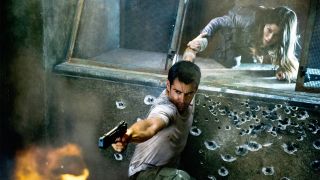
Part of what makes the story of Total Recall so great is its ambiguity. While the audience is happy to go along with the ride and see Douglas Quaid become a super spy and a hero, at the back of your mind you’re always questioning if what we’re seeing is actually happening. Is Quaid actually living the life of a spy or is he just experiencing an implanted memory? It’s a fun and confusing question, and not just for the audience, but the cast as well.
Last summer I was invited as part of a small group of journalists to travel to Toronto, Canada and visit the set of the new Total Recall, directed by Len Wiseman. In between watching them film scenes (you can read all about that HERE) both Colin Farrell and Jessica Biel were kind enough to talk with us about their experience making the film. Check out the interview below in which they discuss not just the big question behind the film, but also performing their action scenes, playing around with futuristic weapons, and finding the emotion behind it all.
How challenging is it to do take after take of that scene that we were just watching?
Colin Farrell: You guys aren’t recent arrivals, right? You have been here for an hour or two I’m assuming based on that question. That was rather…we flew through that disappointingly quick I must say. It doesn’t usually go so swimmingly. It must be the hangover.
Jessica Biel: We talk about it all the time. It’s these little pockets of real passion, emotion, and connection in the midst of a big, huge, wild journey where we are running for our lives all of the time. Firing those big weapons are such bits of just deliciousness. It is a pleasure.
Farrell: There are not a lot of them. I mean, the film is…
Biel: There are only a few. It is pretty nice. I think I just always try to make everything into a love story. That is my problem. [laughs]
CINEMABLEND NEWSLETTER
Your Daily Blend of Entertainment News
Farrell: I think you probably beat us to the punch there. I’m not even signed on for that very last scene you just saw. It is the only reason why I am doing the whole fucking picture. There is so much…this film is kind of extreme in its portrayal of the chaos of action and the cause and effect of violence. There are only these little pockets and windows, as Jessica was saying, where the emotional truth of each of the characters is allowed to creep in and make itself a home. Generally, in my experience, you treat Total Recall the same way you treat anything. It is the same way you treat a stage play, a piece of Greek theater, In Bruges, or whatever it may be. You approach it all the same regardless of the action. You really do. It is not just a lie. You approach it all from the standpoint of your character and just from a human being with whatever human being you are playing. You are just a human being and why are you there? What has them there? What do they want from the situation? So, with that in mind, it is the most fun part. The violence and the action does get repetitive by its very nature, whereas human emotion and thought never gets repetitive. It is very hard, as a human being I find in my 35 years, to experience the same thought in the same way twice. I’ve had the exact same thought about the exact same thing, but it is never the exact same. It is in a different container when it comes a second or third time. So, with that in mind, those scenes that we just did; each take is a little bit different and it continues to grow. I don’t think I would like to experience it but I understand some directors doing….you can get out of hand as a director and do 60, 70, 80, or 90 takes. People may say that is out of hand, but there will always be something new if the emotion and the intellect are engaged. The action does get repetitive. It is fun at the beginning, but it is fucking huge. You just saw 30% of my dialogue in the film [laughs] No, it is not that bad. I take it back.
Do you feel you are able to infuse the same amount of emotion into those action scenes? Do they give you the opportunity to do that?
Biel: That is the key.
Farrell: I try to. They can be so easy to get kind of robotic about it all. It can be very easy. You kind of have to remind yourself.
Biel: Constantly. But that is what Colin was saying about how you have to look at this particular type of material as if you were breaking down a drama with what emotion, thought, and feeling is behind everything whether it is picking up your gun, pointing it, aiming it, or jumping off a building. We are always doing all these crazy things, but you really do have to implement all of these thoughts behind it. Otherwise, it really is just vacant. Your eyes are dead and you’re like, “I jumped, fell, and I made it.” Then you watch it later and you see it. I see it and I catch myself. I’ve done it before in films. I’ve seen my work and I’ve been really embarrassed. Nobody else can really tell, but I see little bits where I didn’t connect it.
Farrell: Because everyone else is going, “She jumped and she made it.” That is kind of only me, but for you inside it…
Biel: I see it in my own work. So I really work very hard to try and fill those moments where it is hard to connect to anything that you are really doing because we are in such a vacuum sometimes. One day I came on set and you said, “I’ve been doing seven seconds of screen time and I don’t even know what I am doing anymore.” It just gets to a point where it is so…
Farrell: It is so fragmented.
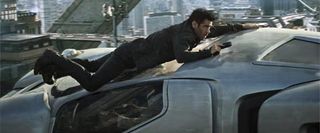
Is that particularly challenging on this film, though? At least from what I know from the short story and the previous film there is a lot of us not knowing what is real and what is not real. Is that difficult for you as well? For example, is it persona A or persona B and what does the audience know at this point?
Biel: It is constantly confusing for us.
Farrell: This is a pretty good argument for none of this shit being real [laughs]. This is like The Matrix, man. I am looking for grids above your head.
So is there a system at place that you have when you are, let’s say, at a certain point in the movie where the audience knows X?
Biel: Now it is really getting creepy. What is happening now?
Farrell: Seriously. That is Laurence Fishburne.
Can you talk about the level of physicality that you both go through? You look kind of beat up here and I believe this is towards the end. Can you talk about the physical things that you are both doing on the set?
Farrell: I get a few slaps around the head and on various parts of the body throughout the film. I inflict a bit more damage than I receive. Otherwise, it would be a short film. They are doing a good job of taking care of business and making sure that I am suitably battered. There is…from the get go. I mean, the opening section of the film starts in a kind of pacifistic place. It is just going to work, the business of living, being on the treadmill, and something of a decent marriage, which isn’t dealt into too deeply. Then I’m assuming 20 minutes in, as soon as I get into the chair, the proverbial hits the fan. Then there is a lot of violence in the film. There is a lot and it goes from one chase to another. Violence is…I think people are propelled towards violence, and what propels them is much more interesting than the actual act of violence itself. With regards to your question about how to differentiate between this scene and that scene so that it doesn’t all become one blind chase and one blind need to escape or one kind of nebulous pacing; hopefully the ante picks up and up and it gets more and more desperate as it reaches the end of the film and as you get closer to some inevitable truth that needs to be experienced, which is kind of the saving of the world I suppose. The world is in a bit of a bad place and Cohaagen is not the autonomous leader that he claims to be. But the violence is fun and it really is a part of it.
Biel: What we have been doing a lot lately is that we are in our harnesses doing wire work, but we are lifted on this big elevator that moves in all of these different directions and we are dropping onto it. I roll off by accident, he grabs me, I am dangling, lifting, and climbing back on to this box that is floating in space. Are we 30 feet up or so?
Farrell: Yeah, about 30 or 40 feet up.
Biel: It is that kind of physical stuff as well. There is a lot of hand to hand combat. Kate [Beckinsale] and I have a cool fight where we do that. Colin does a lot of that. Then we fire a lot of weapons and do a lot of running.
Farrell: She has a great fight with Kate. It’s actually a really cool fight. I was a bit jealous and had a bit of envy.
Biel: It is really cool because it is not a girly fight at all. It is quite a…it’s just like two warriors fighting. We are about to get into some really interesting wire work, which is all of our anti-gravity stuff when we are trying the China Fall, which is this amazing transporting system. So it will be lots of floating physical stuff, which I have never done before. I don’t know if you have ever done it before.
Farrell: Me neither. Not even in my dreams.
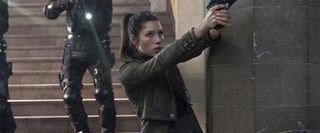
Are you nervous?
Biel: I’m not nervous. It is always really fun. I really enjoy that kind of stuff. I think maybe I’m concerned about…
Not falling on your head?
Biel: I honestly don’t feel worried about that. Once you are on the rig and the guys have you in your harness…I’m sure things can go wrong, but I don’t really feel it. After we do it one time; the first time the adrenaline is pumping and it feels kind of nerve wracking.
Farrell: Yes, until your cherry has been popped, it is a little bit nerve wracking.
Biel: But I think the idea of moving in slow motion is...I’m trying to figure out how that goes exactly and if I can do it now.
Farrell: We were doing it yesterday and it was fun. It really was. Yesterday was the first day. Did they show you around all of the sets? The scene we were just shooting now – that is a people carrier. It is a very futuristic notion of this China Fall concept. Did they explain it to you and how you fall through the earth? So when it traverses the earth’s core, there is a shift in polarity and traversing in anti-gravity for a while. So it was the first time that we did it. It was 50 people, myself, Bokeem Woodbine, and a bunch of day players trying to figure it out. It took a while. Some people had their legs floating lovely, half of them had them like a child, and one guy was cycling. The director was like, “Cut! No cycling!” [laughs] But it was a lot of fun. About two hours in there we were just saying, “Get ready!” and everyone was just doing it. It was so much fun. That kind of stuff after doing reams and reams of action, because we had just come off lots of action, was really fun. It was so pathetic and it was like, “I get to engage the brain and body a bit.” It was a challenge and it was something to do. Then, of course, after a while of doing that you’re like, “Okay. Can we do something else?” This film is all of these little chapters. Some of these set pieces take eight or nine days to do. They are fucking huge!
You guys did a 15 day hover craft chase sequences from what I understand.
Farrell: That is including second-unit.
Biel: Second-unit is still doing that.
Farrell: Really? Wow.
Can you talk about how you think that scene is going to look like?
Farrell: It should look really cool.
Biel: It’s going to be so cool. The hover cars were literally built on top of race cars.
Farrell: They really did customize it. It is like something from Mad Max. It is this fabricated thing with massive engines, cages, and then they mounted on top the hover craft.
Biel: So we are actually moving and not just sitting there with four grips shaking the thing, which is kind of what I expected. [laughs] I’m not used to these big budget films anymore.
Farrell: Me neither.
Biel: So these things are literally massive adult series bumper cars. Kate is in one and we are in another one and these guys are slamming us. Our heads are rocking and it is so cool.
Farrell: It is so cool! Honest to god, just reacting to it…
Biel: It is going to look amazing. It was a real kind of experience. It was scary.
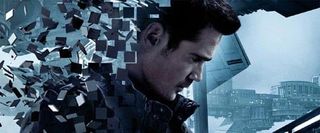
Farrell: It was an instantaneous response. It was a very immediate and very physical. It was kind of shocking a couple of times. Plus, these things were built and they took a while to build to great expense up until time and time again. But the hover part at the top is a little bit plasticy, even though you will never see it in the film. So in the middle of a take a fucking screw would go. [laughs]
Biel: There is one point where we first got in and they said, “So the door doesn’t shut so you can roll out. So you have to strap yourself extra in.” I had to wrench my own door close at one point. [laughs]
Farrell: But it does so much of the work for us. I mean, with all of the green screen that is prevalent in the studios. If you have a look around, I am not feeling like I am stuck on this kind of unhuman island where I have to communicate with an idea, which is good because I have actors around me and stuff. But the actual space we are shooting in; the practical sets are really fucking magnificent. Then, this greater notion of how the world is topographically different will be put in green screen. But while we are shooting, even if it’s a lift, we are shooting in it and behind the lift outside you will see this big chasm. I saw the artwork that is going to be designed and put in post, but the lift is beautiful. The designer has designed it so magnificently and Len has helped draw a lot of the concepts as well. That stuff is so…you always bring your own imagination, of course, but the environment is helping me certainly do a lot of the work. The sets are amazing. So there is a lot of green screen, but I am not having to talk to Jar Jar Binks. I don’t feel that I’m having to…
So Jar Jar Binks is not in this movie?
Farrell: Well, there might be just a cameo, but I don’t want to ruin it for all of those many Jar Jar Binks fans that are out in the world.
There are all of these action movies like Inception and the Matrix movies. The primary drama is the intangibility of memory, reality, and what is real and what is not. But they are action movies. Do you think it is inherently cathartic to deal with an existential crisis by hitting and shooting something? Is this something that you can bring to your performance?
Farrell: [laughs] I think so. Someone once told me that in Japan there is a place or places where you can go and buy like a hundred plates and fucking throw them against the wall.
Biel: Really? That is a great idea.
Farrell: It is a great idea, whether it exists or not. I think that touches into what you are saying. I much prefer for people to go to shooting ranges and shoot at two-dimensional paper targets than to have to go out in the street or to foreign territories and do the same. I think, as human beings, we at times overvalue the intellect and we undermine the body. I don’t mean a body externally and the shape of a body. I mean the intelligence of a body, the memories that a body can store, how a body feels emotion, and how a body processes emotion. So I think with that in mind, I think you are possibly right. I love a good bit of discourse myself. I love a good existential conversation when I don’t get too in over my head and feel like a dipshit. At the end of the day, I think it is really good to get it on its feet. I had a really cool time talking about all of these scenes with you and with Len. At the end of the day, there is a literally a moment where I go, “Can we just get up now, talk about it, and move through it?” So, yeah, I think you are right.
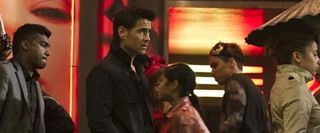
What is it like dealing with the weight of working on a film that is a science-fiction staple? Is there anything from the original film where you were like, “I demand we include this!” or is there anything that you were excited that they included?
Farrell: No. Not really. I really came to this as a fan of film and as a fan of the original as well. I really engaged with this script and with the concept of the whole story – the idea of the world that is created. As a film fan I was just like, “Wow!” When I saw that artwork I was like, “Fucking hell! I can really be in that frame?!” When I sat with Len I didn’t say it to him because I was really having a nerd moment where I was like, “Oh my god. I can be in that? That is really good and interesting.” So, no, I don’t feel that anything…I am trusting Len’s vision and I am trusting that there is enough. You know, the frame work of the story is the same. If anyone has read the short story….the original is not so much like the short story, and this is not so much like the short story. The short story is really fucking dark and fucking genius. What he achieves in 18 or 19 pages is so astonishing in how he can bend my cerebrum and have me guessing what is real and what is not. But that is a different film. That is Kafka and this is not that. I just trust and hope that there will be enough because it is a weird thing with remakes. I am having a bit of an experience now with remakes because of Fright Night and then this. Part of me wants to apologize, part of me wants to win over all of the old fans, and part of me wants to go “Fuck everyone!” [laughs] I don’t know what to do. You are dammed if you do and you are dammed if you don’t. There seems to be this thing where it is like “Why do a remake if it is just going to be the same exact thing?” So then you do a remake, reimagining, or a reinvestment in a story and it is different enough. Then they are like “They didn’t even put that thing in!” So you are dammed either way. I just hope that this will be an individual cinema experience. I really do. I hope that, like how I do with Fright Night, that fans of the original, like myself, will go watch it and say “Oh, we fucked up.” I am not beyond criticizing myself and my own work. But I hope the fans of the original enjoy it and I hope it finds a new audience. Maybe some people will go back and watch the original. Who knows?
Is there something in this movie that you can compare to the original in that sense where people are going to take away from it? Is there something that is really going to stick out?
Farrell: Conceptually there are some really cool things that we are filling in and there is the human aspect too, but that will be put in later. As far as a character stuff goes, there are a couple of really interesting…I wouldn’t even know what the fuck to talk about. It is so weird because we are right in the middle of it with 5 weeks left. I mean, the three breasted lady is in there. I know you wanted to…she was on the tip of your tongue. I could see [laughs]. I know where you were like. “The lady with the mask and the three…” [laughs] But you have to at the same time I think consciously have a nod of the head when you can have a bit of fun based on something that was offered up from the original and take that in. But as far as new stuff goes…I don’t know. The whole thing felt…the fact that it doesn’t go to Mars. There might be a little less extremeisms. There is not the scene where the eyes are exploding. There are no Martians and there are not…
Biel: I don’t know. I think the weapons, the hover crafts, and the other ways of transportation. I that is going to be pretty…it feels to me more intellectually mind blowing than it is like “Whoa! We have never seen this particular kind of effect before!” It is not necessarily that anymore. That was such a specific time where it was really still a challenge to do those types of things. Now we have such an opportunity and possibility to create those kinds of things. So it is more about weapons and things. Some of the weapons that we shoot…my gun is a 9mm Beretta, but it is automatic. It doesn’t exist. It actually would explode if we shot real bullets out of it.
Farrell: She is like fucking RoboCop on set. It is ridiculous.
Biel: It is amazing. It is an incredibly sexy and beautiful 9mm that shoots like a machine gun. It is kind of intense.
Farrell: Then there is this futuristic Bolo weapon that shoots a Bolo web that wraps around the body. As soon as it makes impact it lights up in a white flair and it wraps around like an octopus taking a body.
So that is what you were shooting…
Farrell: Yes. I was shooting someone and there is a magnetized system on it. So there are loads of stuff that are kind of cool.
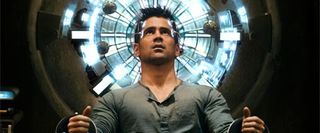
This question is for Ms. Biel. Colin is out point of view character and his head is memory soup. So if he is our point of view character the reality of the movie is constantly changing. Do you feel that you are playing different characters each time we are entering a different phase of his memory salad?
Biel: Memory salad? That sounds delicious. What kind of dressing do you have on there? Is that vinaigrette?
Farrell: It was a two course meal. It started with memory soup and went to salad. [laughs]
Biel: That is a good question, but no. I don’t feel like…even though Quaid is our point of view and he is taking the audience along on his journey, which is quite confusing. I think an important element to my character is that she is very consistent. She is pretty consistent in what she believes in. There are many times where it is confusing, but I think she knows what they experienced together. She remembers it. She is a little bit unsure about how he feels about things a lot of the time, but she is aggressive in her consistency about “I need you to come with me and we need to do these things. I am crossing my figures that you will eventually remember.” Then when all of this different information starts coming at her and all of these different possibilities of Quaid maybe having been a part of this infiltration and the stealing of ideas and actually getting Cohaagen to find out where my father is – that gets a little confusing. But we are still maintaining this idea that Melina is very clear and more than anything believes in what this person remembers. It is kind of what were you saying about physically…we deal a lot with this idea of “Does he remember or does he just feel it?” Like you said, the brain is a memory soup. It can’t really be trusted but that feeling of “I know. I just know for some reason.”
Farrell: Yes. She represents the truth I think. I think Melina in the film is kind of the emotional anchor of the story. I really do. She represents the truth and Quaid represents the audiences’ disorientation as a result of an inability to grasp what is truly real and what is not and what is a construct of the mind and what is a construct of the cause and effect of experience. The whole thing, with all of the action, really comes down to “If you don’t give a fuck about what the characters are going through; the film just won’t work” It really won’t even with all the gadgetry and all of the wonderfully conceived and creative visions of the future and what it may hold – if you don’t care about the journey of Melina, Quaid, or side with Cohaagen the film doesn’t work.
Biel: The scenes we did today are so important for those reasons because we only have three or four moments. If we haven’t gotten to you in your heart this first time we have two or three more to make you really want these people to be together. You really want him to remember her or you really want her to convince her.
It sounds like you are doing most of your own stunts, but is there anything that they won’t let you do?
Biel: There is always something. There is always…
Farrell: What is it? I want to do it now!
Biel: It is always plate glass or sugar glass. If you have to bust through glass…they never let you bust through glass because someone always gets cut even though it is sugar. So we are always requesting to do that kind of thing. So there is that, but pretty much everything else. We were talking about rolling off the elevator and that was really cool because we got to do all of that stuff.
Farrell: The insurance costs must be huge on these kinds of things. It was a lot of wire work from pretty high up. But I feel pretty safe and there is a lot of fighting. Those cars, while they were slamming into each other, were about as unsafe as I have felt in the 15 years of doing this shit. I am talking about 20 elephants, 80 horses, and 400 extras going on “Action!” and that was a bit safer.

Eric Eisenberg is the Assistant Managing Editor at CinemaBlend. After graduating Boston University and earning a bachelor’s degree in journalism, he took a part-time job as a staff writer for CinemaBlend, and after six months was offered the opportunity to move to Los Angeles and take on a newly created West Coast Editor position. Over a decade later, he's continuing to advance his interests and expertise. In addition to conducting filmmaker interviews and contributing to the news and feature content of the site, Eric also oversees the Movie Reviews section, writes the the weekend box office report (published Sundays), and is the site's resident Stephen King expert. He has two King-related columns.
Most Popular






